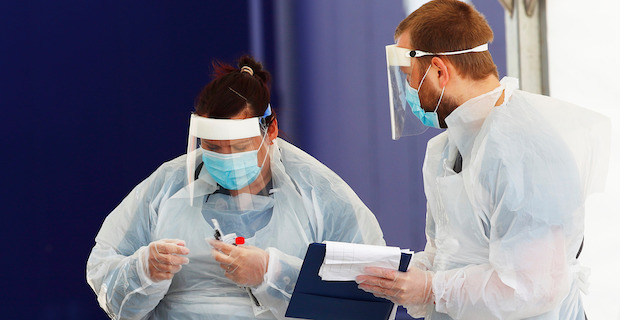In a worst-case scenario, a second wave of the novel coronavirus could kill up to 120,000 people in Britain, according to a new expert report. A commission of experts modeled a “reasonable worst-case scenario” for COVID-19 in the approaching winter and shared the report with the government, according to reports by local media, including The Guardian.
The commission led by Sir Patrick Vallance, the UK’s chief scientific advisor, found that, if a second wave hits, the R value – average number of others a person passes the disease onto – could reach 1.7 in September from around 0.9 at present.
According to the experts’ modeling, hospital admissions and deaths would peak in January and February 2021, and up to 120,000 hospital patients could die in a second wave.
Stephen Holgate, chair of the expert group and professor of immunopharmacology at the University of Southampton, was quoted by The Guardian as saying that immediate action could reduce the risk of a worst-case scenario.
“The modeling suggests that deaths could be higher with a new wave of COVID-19 this winter, but the risk of this happening could be reduced if we take action immediately,” Holgate said.
“With relatively low numbers of COVID-19 cases at the moment, this is a critical window of opportunity to help us prepare for the worst that winter can throw at us,” he added.
The report suggests that a less severe second wave might lead to 1,300 or 75,000 deaths between September 2020 and June 2021.
Dame Anne Johnson, a co-author of the report and professor of infectious disease epidemiology at University College London, said the UK needs a powerful public information campaign.
“Everybody needs to realize that COVID-19 hasn’t gone away, and therefore everybody can help reduce transmission by social distancing, by the wearing of face coverings as a social norm, by good respiratory and hand hygiene and the right level of heating and ventilation in our homes,” she said.
The coronavirus pandemic has so far killed almost 45,000 people across the country in all settings.


 Prime Minister Keir Starmer's 2025 Easter message
Prime Minister Keir Starmer's 2025 Easter message After Nesil Caliskan a by-election will be held in Jubilee ward in Enfield
After Nesil Caliskan a by-election will be held in Jubilee ward in Enfield Publishing the analysis, Labour’s Cllr Ergin Erbil said Everybody in Enfield deserves basic rights
Publishing the analysis, Labour’s Cllr Ergin Erbil said Everybody in Enfield deserves basic rights Gaza-Israel conflict Statement from Cllr Ergin Erbil, Leader of Enfield Council
Gaza-Israel conflict Statement from Cllr Ergin Erbil, Leader of Enfield Council The European Union called on Turkey to uphold democratic values
The European Union called on Turkey to uphold democratic values Turkish citizens in London said Rights, Law, Justice
Turkish citizens in London said Rights, Law, Justice The Council of Turkish Cypriot Associations Geneva response letter
The Council of Turkish Cypriot Associations Geneva response letter Sustainable Development and ESG, Will This Become the Course for Turkic World
Sustainable Development and ESG, Will This Become the Course for Turkic World The 'Prince of Paris' has impressed in his first EuroLeague season
The 'Prince of Paris' has impressed in his first EuroLeague season Saran Media And Euroleague Basketball Extend Media Rights Partnership for Four More Years
Saran Media And Euroleague Basketball Extend Media Rights Partnership for Four More Years Will Rangers be Jose Mourinho’s next victim?
Will Rangers be Jose Mourinho’s next victim? Jose Mourinho's Fenerbahce face Rangers on Thursday
Jose Mourinho's Fenerbahce face Rangers on Thursday Barclays has become the biggest UK lender so far to cut mortgage rates
Barclays has become the biggest UK lender so far to cut mortgage rates THE SPRING STATEMENT EXPLAINED, UK ECONOMIC OUTLOOK AND GROWTH FORECASTS
THE SPRING STATEMENT EXPLAINED, UK ECONOMIC OUTLOOK AND GROWTH FORECASTS Launch of Made in Enfield gift shop to celebrate local artists and designers
Launch of Made in Enfield gift shop to celebrate local artists and designers Trial used smart Wi-Fi sensors for live building occupancy data to optimise
Trial used smart Wi-Fi sensors for live building occupancy data to optimise
















